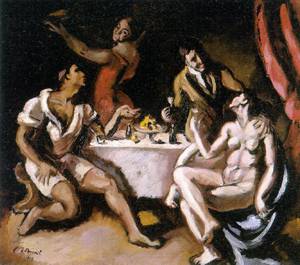 My roots are in Prague. Not my real hereditary-type roots — they lie somewhere in Lithuania, in some long-forgotten shtetl in the Pale of Settlement.
My roots are in Prague. Not my real hereditary-type roots — they lie somewhere in Lithuania, in some long-forgotten shtetl in the Pale of Settlement.
I’m talking about my cultural roots, my identity as a bohemian, or in the current vernacular, a boho. The bohemian movement started in Prague, or at least was perfected there. Also, Prague is the capital of Bohemia, which is an historical region that takes up about two-thirds of the current Czech Republic. So, Prague is Bohemian and bohemian. Around 1912, Franz Kafka met a Yiddish-Theater actor named Isaac Löwy, who introduced him into a world of writers, artists, thinkers, physicists and anarchists.
They hung out in bars or in Berta Fanta’s salon – upstairs from her husband’s pharmacy; they drank absinthe, they had sex with actresses (I’m sure they did; I don’t have historical data at my fingertips, but believe me, they did); they stayed up all night and talked about Expressionism and Modern Music; they discussed the ideas of Einstein and Freud, who were both kicking up their heels around this time.
These are my people – artistic, passionate, brilliant, a bit louche and always horny. This is the world I aspired to when I was trying to escape from my suburban middle-class background. Bohemia was where I wanted to be.
 Our first morning in Prague was grey and drippy.
Our first morning in Prague was grey and drippy.
The angels, saints and devils — black from centuries of soot — that loom over the bridges and monuments, were all the more creepy in the rain as we made our way across the Charles Bridge to the Franz Kafka Museum.
We spent hours there, learning about his difficult life, his thoughts, his relationships and, of course, his work, which was to change the way the world thought about writing. The best thing we learned is that the word Kafkaesque, which is generally thought to mean weird, distorted, nightmarishly bizarre and complex, actually means seeing the truth when everyone else is complicit in the lie. We liked that a lot.
The rest of our day, everything we saw was Kafkaesque – the streets, the bridges, the Czechs, the whole rainy city. Later in the evening, I coerced Jill into an absinthe bar and she patiently waited for me as I knocked back the fiery booze they call The Green Fairy. Each sip made everything even more Kafkaesque.
 Alas, we didn’t eat terribly well in Prague. It was okay; I tried my best with roast pork knuckle with dumplings with red cabbage; I had some goulash, which is actually more Hungarian than Czech; Jill was tap-dancing with not-quite-fresh vegetables and dry rice. We rationalized that we didn’t go there for the food – more for the soul. The best I did was a sausage – like a hot dog but spicier – rolled up in a kind of Bohemian tortilla that we found at a stand in the Old Town Square.
Alas, we didn’t eat terribly well in Prague. It was okay; I tried my best with roast pork knuckle with dumplings with red cabbage; I had some goulash, which is actually more Hungarian than Czech; Jill was tap-dancing with not-quite-fresh vegetables and dry rice. We rationalized that we didn’t go there for the food – more for the soul. The best I did was a sausage – like a hot dog but spicier – rolled up in a kind of Bohemian tortilla that we found at a stand in the Old Town Square.
Good hot dog.
Way to go, Prague.
I spoke to my friend, Large Louie, the day we left Prague and I told him I hadn’t eaten particularly well. He had been to Prague the year before.
“What did you eat?”
“Czech food,” I said.
“Big mistake. We ate Chinese every night. It was fantastic.”
“Now you’re telling me this? Where were you when I needed you?”
“I have to tell a Jew to eat Chinese food?”
He had a point.
Michael Tucker is an actor and author whose third book is the recently published Family Meals: Coming Together to Care for an Aging Parent. You can read more about his food adventures on his blog Notes from a Culinary Wasteland.

